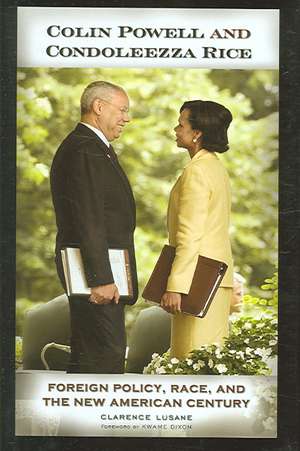Colin Powell and Condoleezza Rice: Foreign Policy, Race, and the New American Century
Autor Clarence Lusaneen Limba Engleză Hardback – 29 mai 2006 – vârsta până la 17 ani
Preț: 323.53 lei
Preț vechi: 393.03 lei
-18% Nou
Puncte Express: 485
Preț estimativ în valută:
61.91€ • 64.64$ • 51.24£
61.91€ • 64.64$ • 51.24£
Carte tipărită la comandă
Livrare economică 05-19 aprilie
Preluare comenzi: 021 569.72.76
Specificații
ISBN-13: 9780275983093
ISBN-10: 0275983099
Pagini: 288
Dimensiuni: 156 x 235 x 28 mm
Greutate: 0.59 kg
Editura: Bloomsbury Publishing
Colecția Praeger
Locul publicării:New York, United States
ISBN-10: 0275983099
Pagini: 288
Dimensiuni: 156 x 235 x 28 mm
Greutate: 0.59 kg
Editura: Bloomsbury Publishing
Colecția Praeger
Locul publicării:New York, United States
Notă biografică
CLARENCE LUSANE is Associate Professor at the School of International Service, American University, where he teaches courses in global race relations, anti-discrimination policy, and international drug politics. He is the author of six previous books, including Hitler's Black Victims (2002), Race in the Global Era (1997), and The Struggle for Equal Education (1992). He is a recipient of the prestigious British Council Atlantic Fellowship in Public Policy and a board member of the Institute for Policy Studies.
Cuprins
Introduction: What Color Is Hegemony?A Commonality of Circumstances: Black Americans and U.S. Foreign PolicyThis Is Not Your Father's Republican Party: Powell, Rice, and the GOPTurkeys in the Straw: Race and Representation in the Era of George W. BushWhat Color Is Hegemony? The U.S. New Security ParadigmThe Clash: Iraq in the Crosshairs of HegemonyCounter-Hegemony in the Global South: Africa Challenges the Powell, Rice, Bush DoctrineCounter-Hegemony in the Global South: The Americans Say "No Pasaran" to the Bush DoctrineWashed Up: The Legacies of Powell and Rice (and Bush)
Recenzii
The author establishes that race has played a preeminent role in the assumptions underlying American foreign policy decisions and that the war on terrorism is narrowly defined to exclude the terrorism of global human security that Darfur and other places manifest..Lower-division undergraduates through graduate students.
Lusane analyzes the impact of race on U.S. foreign policy by examining how former Secretary of State Colin Powell and current Secretary of State Condoleezza Rice have constructed current policy. He argues that African Americans have a long history of participating in U.S. foreign policy and that blacks serving in foreign-policy posts in previous administrations have embraced their racial identities and stressed racial equality in the world. This, he writes, was owing to the historical racism experienced by blacks in the United States. According to Lusane, Powell and Rice have not embraced their racial identities unless doing so has promised to advance the Bush administration's agenda; instead, both champion the idea of individualism. This break with tradition has upset many in the African American community..Recommended.
This work argues that the racial identity of Secretary of State Colin Powell and National Security Adviser Condoleeza Rice, the first African Americans to be appointed to their positions, helped shape the presentation of the hegemonic foreign policy of the George W. Bush administration, but played very little role in the actual formation of that policy. Author Lusane suggests that they played a game of racial affinity that was used to justify a more dangerous foreign policy and to distract from their more substantive roles in policy formation. Along the way, he provides a history of African American attitudes towards foreign policy, examines the 2001 UN World Conference on Racism as a case study on the intersection of race and Bush foreign policy, and details the role of Powell and Rice in bringing us the Iraq War.
[R]eveals how many Blacks presumably feel, and it therefore it performs a public service.
Lusane analyzes the impact of race on U.S. foreign policy by examining how former Secretary of State Colin Powell and current Secretary of State Condoleezza Rice have constructed current policy. He argues that African Americans have a long history of participating in U.S. foreign policy and that blacks serving in foreign-policy posts in previous administrations have embraced their racial identities and stressed racial equality in the world. This, he writes, was owing to the historical racism experienced by blacks in the United States. According to Lusane, Powell and Rice have not embraced their racial identities unless doing so has promised to advance the Bush administration's agenda; instead, both champion the idea of individualism. This break with tradition has upset many in the African American community..Recommended.
This work argues that the racial identity of Secretary of State Colin Powell and National Security Adviser Condoleeza Rice, the first African Americans to be appointed to their positions, helped shape the presentation of the hegemonic foreign policy of the George W. Bush administration, but played very little role in the actual formation of that policy. Author Lusane suggests that they played a game of racial affinity that was used to justify a more dangerous foreign policy and to distract from their more substantive roles in policy formation. Along the way, he provides a history of African American attitudes towards foreign policy, examines the 2001 UN World Conference on Racism as a case study on the intersection of race and Bush foreign policy, and details the role of Powell and Rice in bringing us the Iraq War.
[R]eveals how many Blacks presumably feel, and it therefore it performs a public service.













